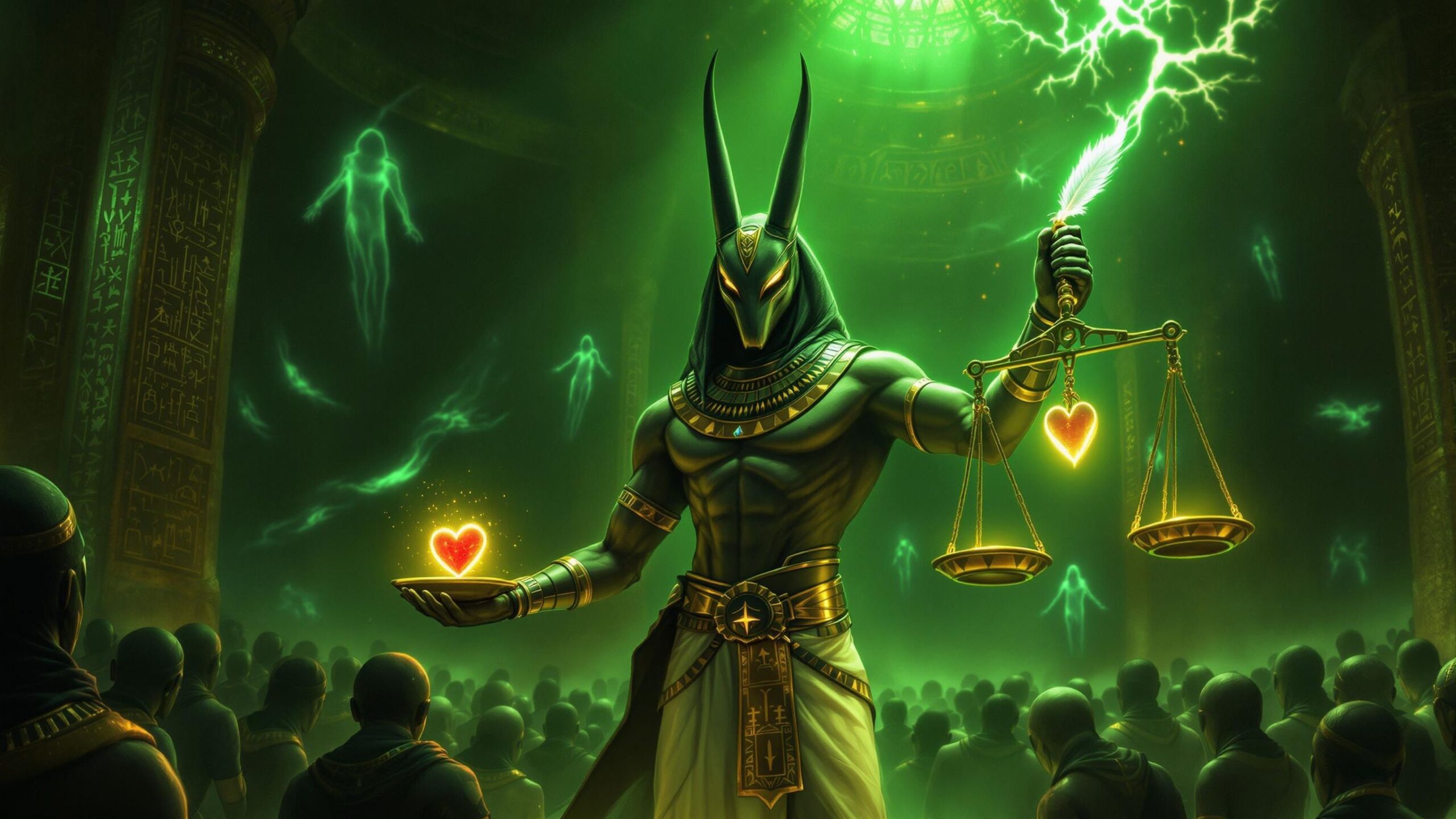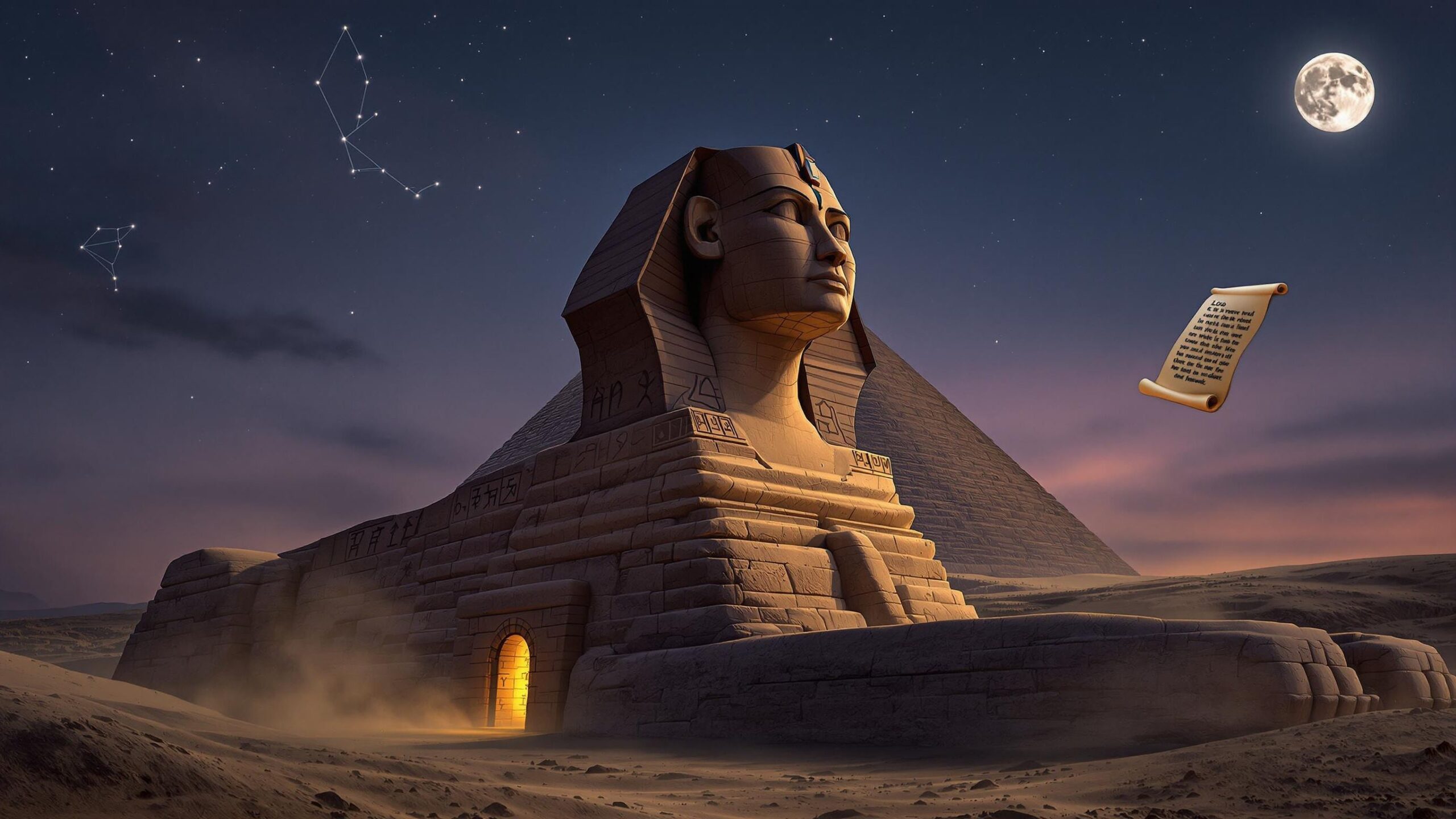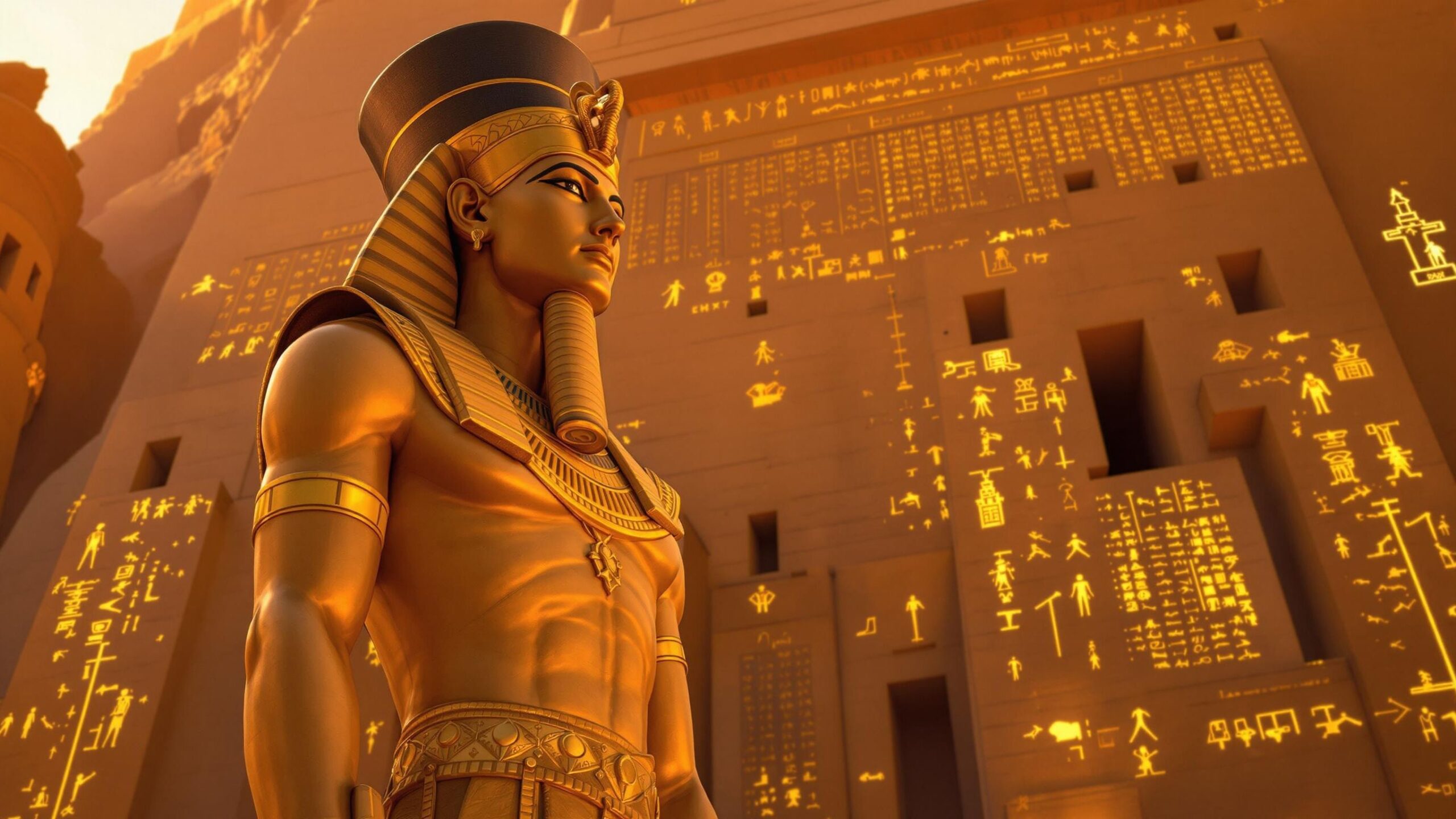Among the gods of ancient Egypt, Anubis walks in shadow and silence. With the sleek black head of a jackal and the solemn posture of a judge, Anubis ruled the liminal space between life and death. Before Osiris became lord of the underworld, Anubis was the original guardian of the dead—the god who watched over graves, wrapped the departed in linen, and ensured the sacred rituals of passage were obeyed. Egyptians feared and revered him not as a bringer of death, but as its guide. Every funeral prayer, every tomb offering, every whispered plea in the afterlife passed beneath his unblinking gaze. Anubis didn’t simply haunt the necropolis—he ran it. These ten powerful roles reveal the many ways Anubis controlled the fate of the dead and carved the rules of the afterlife into the eternal sands of time.
#10: He Invented the Ritual of Mummification
Long before the embalming priests of Egypt wrapped the bodies of pharaohs in linen and amulets, Anubis was the first to prepare a corpse for eternal life. The myth of Osiris’s death—when set dismembered him and scattered his body across Egypt—sets the foundation for this tale. It was Anubis who gathered the pieces of Osiris, gently embalmed them, and wrapped the body in sacred cloths, turning death into a form of resurrection. This act became the blueprint for mummification. But Anubis wasn’t merely performing a ritual—he was rewriting the rules of death. By preserving Osiris’s body, he ensured the possibility of rebirth, setting the standard for every funeral rite in Egypt that followed. In doing so, Anubis took death—a terrifying void—and gave it structure, hope, and dignity. Every mummy ever laid to rest in ancient Egypt bore the echo of Anubis’s first sacred act.
#9: He Guided Souls Through the Duat
The Duat, or Egyptian underworld, was no peaceful afterlife—it was a treacherous realm filled with traps, monsters, judgment halls, and divine gates. Souls were easily lost, confused, or devoured if they didn’t know the way. That’s where Anubis stepped in. As the “Opener of the Ways,” Anubis acted as a divine psychopomp, guiding the dead safely through the darkness. He appeared at funerals, statues of him placed atop coffins, his presence invoked to protect the deceased during their perilous journey. Without Anubis’s guidance, the dead were vulnerable to the chaos of the afterlife. With him, they had a path. He didn’t just walk the Duat—he mapped it. For thousands of years, Egyptian souls entered death with a single prayer: that Anubis would walk beside them in the land of shadows.
#8: He Presided Over the Weighing of the Heart
One of the most iconic images in all Egyptian mythology is the weighing of the heart ceremony. In the Hall of Ma’at, the soul’s heart was placed on a golden scale and weighed against a feather—the symbol of truth. Anubis presided over this moment. With precise, divine hands, he controlled the scales. His judgment was absolute. If the heart was heavier, bloated with lies, greed, or murder, it was fed to the devourer Ammit, and the soul was obliterated. If the scales balanced, the soul passed into eternal peace with Osiris. Anubis wasn’t a god of wrath, but of order. He didn’t punish—he measured. In this role, he didn’t just determine the fate of individuals—he upheld the entire moral framework of Egyptian civilization. Justice, in their world, came with a jackal’s face.
#7: He Marked the Sacred Ground of Cemeteries
Before there were necropolises and stone pyramids, the Egyptians associated jackals with death because of their presence near cemeteries. To protect the dead from scavengers—both animal and human—Anubis was invoked as a guardian of burial grounds. Shrines to Anubis were built at tomb entrances, and his image was often painted onto sarcophagi and funerary stelae. It was believed that wherever a tomb was prepared with Anubis’s name, the area became sacred, protected by divine law. Grave robbers feared his wrath. Tomb builders sought his blessing. Even the layout of certain tomb complexes followed symbolic patterns tied to his role as gatekeeper. Through this, Anubis shaped not only the spiritual fate of the dead but the very landscape of how and where they were laid to rest.
#6: He Watched Over the Embalming Priests
Anubis wasn’t just a distant deity—he worked through human hands. Embalming priests, known as the “Servants of Anubis,” wore jackal-headed masks during mummification rituals to embody the god himself. Every incision, purification rite, and chant were performed under his invisible guidance. He sanctified the tools, oversaw the removal of organs, and ensured that no part of the ritual went unfulfilled. This wasn’t just technical—it was spiritual theater. The priests believed that channeling Anubis ensured the soul’s acceptance into the afterlife. In this way, Anubis didn’t merely control the metaphysical realm—he operated in the physical world through his devotees, shaping the fate of every corpse prepared in his name.
#5: He Protected the Body from Spiritual Attack
In Egyptian belief, the dead were vulnerable not just to decay, but to spiritual assault. Evil spirits, chaotic forces, and curses could all interfere with a soul’s journey or even destroy it entirely. Anubis acted as the spiritual bodyguard. Amulets bearing his likeness were placed within mummy wrappings, his spells carved into tomb walls, and his statues positioned to watch over burial chambers. Some texts speak of Anubis warding off demons in the Duat, striking them down with divine flame or blinding them with his gaze. The dead rested easier knowing Anubis stood sentinel. Even in the Book of the Dead, protective spells invoked his name to repel enemies of the soul. His presence was the ultimate insurance—against theft, spiritual intrusion, and the unraveling of the journey toward eternity.
#4: He Oversaw the Opening of the Mouth Ceremony
One of the most sacred rituals in ancient Egyptian funerary tradition was the “Opening of the Mouth” ceremony, believed to restore the senses of the deceased. This rite allowed the soul to breathe, speak, eat, and see in the afterlife. Anubis presided over this magical ritual, guiding the priests as they touched the mouth, eyes, and limbs of the mummy with ceremonial tools, often shaped like adzes or sacred blades. In some depictions, Anubis himself performs the rite, touching the mouth of the departed with reverent grace. This wasn’t mere symbolism—it was believed that the ceremony reactivated the ka (spiritual essence) of the individual, enabling them to fully experience the afterlife. Without Anubis’s blessing in this ritual, the soul would remain inert trapped in silence. With him, the dead came alive again, awakened into their next form of being.
#3: He Maintained the Balance Between Chaos and Order
In Egyptian cosmology, the universe was a constant struggle between Ma’at (order) and Isfet (chaos). Anubis was a vital enforcer of Ma’at within the realm of the dead. He ensured that tombs were undisturbed, that rituals were correctly performed, and that the judgment process was not tainted. Legends speak of Anubis hunting down necromancers who tried to raise the dead, or confronting beings who sought to disrupt the Duat. In a world where even gods could fall prey to deception and trickery, Anubis was incorruptible. He did not take sides—he maintained balance. His neutrality was his power. In this role, Anubis acted not just as a protector of individual souls but as a cosmic custodian, preserving the universal order that allowed both life and death to exist harmoniously.
#2: He Punished Those Who Defiled the Dead
Anubis was not a forgiving deity when it came to the desecration of the dead. Tomb raiders, ritual violators, and even careless embalmers were believed to incur his wrath. Ancient curses inscribed on tomb walls often invoked Anubis as the enforcer—promising blindness, madness, or sudden death to those who disturbed the sacred rest of the deceased. These weren’t idle threats. Stories from Egyptian folklore describe individuals who looted tombs only to fall ill, suffer terrifying hallucinations of jackal-headed figures, or vanish into the desert. These tales served not just as warnings, but as testaments to Anubis’s enduring power. Even in death, those who trusted Anubis could rest in peace, while those who violated that trust risked eternal consequences.
#1: He Determined Whether a Soul Deserved Eternity
In the end, Anubis was the gatekeeper of forever. Every soul, regardless of status, came before him. With serene impartiality, he weighed their hearts, judged their rituals, reviewed their tombs, and listened for Ma’at’s whispers. Through all his roles—as embalmer, protector, guide, judge, and punisher—Anubis wielded quiet but absolute control over who passed into paradise and who vanished into oblivion. In a civilization obsessed with the afterlife, Anubis was the final word. He didn’t just tend to death—he ruled its meaning. Pharaoh or farmer, rich or poor, all were equal under the eyes of the jackal. And in that gaze lay the power to grant peace or deny it forever.
Anubis may not have been the most flamboyant of the Egyptian gods, but his influence was unparalleled. He was the guardian of transition, the silent judge of hearts, the divine embalmer who ensured that the dead were not lost to time or chaos. Every tomb, every mummy, every sacred rite bore the mark of his guidance. In a culture where death was just the beginning, Anubis was the one who shaped that journey—measuring, guiding, and protecting every soul with unwavering discipline. More than a god of the dead, he was the architect of eternal peace. And in every shadowed tomb and whispered prayer, his legacy remains—quiet, watchful, eternal.




